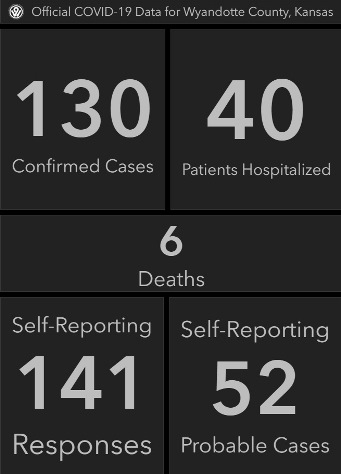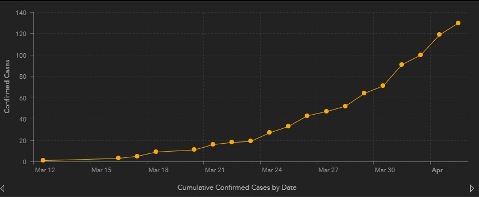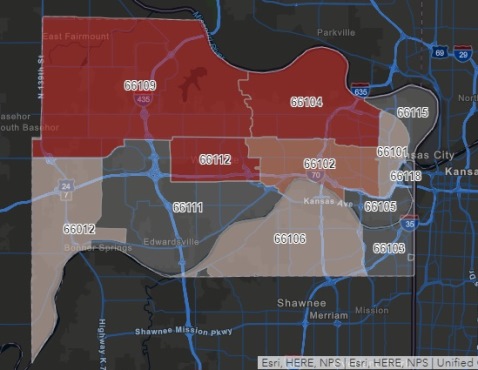


The Unified Government Health Department is opening a COVID-19 testing site today at the Health Department parking lot, 619 Ann Ave., Kansas City, Kansas.
Those Wyandotte County residents who are eligible for testing, according to a UG news release, will have to schedule a time to drive or walk-through for testing.
According to the UG’s COVID-19 website, there were 130 positive cases with one additional death reported in Wyandotte County at 12:50 p.m. Friday, April 3. There were a total of six COVID-19 related deaths in Wyandotte County.
The testing site will be open from 2 to 5 p.m. on Mondays, Wednesdays and Fridays.
The testing site will be in a trailer in the parking lot at the Health Department and City Hall. Patients should use the self-reporting tool on the UG’s website first or call ahead to 311.
Some residents have had difficulty in getting tested for COVID-19, with a nationwide scarcity of test kits and supplies needed for the tests. Some local doctors’ offices are not offering the tests. Tests are available for those who qualify and had symptoms at the Dr. Sharon Lee Family Health Clinic on Southwest Boulevard, with patients calling ahead to see if they qualify.
Testing priority at the new testing site at the Health Department will go to those who are experiencing symptoms of COVID-19, which include a fever of more than 100 degrees, shortness of breath and a dry, unproductive cough, according to a spokesman.
Dr. Erin Corriveau, deputy medical officer for the UG Health Department, in a news release acknowledged the importance of increased testing for Wyandotte.
“Ramping up testing capacity in Wyandotte means getting a better picture of what we are really dealing with,” Dr. Corriveau stated. “We felt it was a key part of our purpose as a local health department to help make this happen. More testing for our community will help us see where and how COVID-19 is spreading. This is crucial information to help us more effectively stop the spread of this disease in our community.”
To run the new test site, the UG Health Department Emergency Preparedness trailer will be stationed in the parking lot next to the Health Department and City Hall. The trailer is equipped with the appropriate supplies and technology for staff to operate outside of the building, according to a spokesman. Staff will have the necessary personal protective equipment (PPE) to keep them safe while they collect specimens from patients for testing, the spokesman stated.
Residents who think they may have COVID-19 should report their symptoms from home to see if they are eligible for testing, according to the news release. One way Wyandotte residents can report symptoms is through the UG’s online “Self-Report Your Symptoms” tool.
“We encourage people to use the confidential self-reporting tool if they are experiencing symptoms like fever, new onset cough, or shortness of breath,” Dr. Corriveau stated. “Once someone reports symptoms online, our Health Department staff will reach out to them to provide guidance on what to do if they’re feeling ill, and with details regarding how to get tested. Self-reporting symptoms online also gives our disease investigators more data to track the spread of COVID-19 in our county.”
The reporting tool is available in English and Spanish at wycokck.org/COVID-19. Residents who do not have access to the internet can call 3-1-1 to report their symptoms.
People with COVID-19 symptoms can also call their primary care provider to report their symptoms and be referred for testing. Health Department staff have worked closely with community clinics so that they are prepared to submit testing referrals to the new Health Department site, according to the news release.
The testing clinic will run from 2 to 5 p.m. Monday, Wednesday and Friday. No unscheduled “walk-ups” or “drive-ups” will be accepted for testing, according to the Health Department. Location and hours are subject to change. Testing is offered for Wyandotte County residents only at this time.
For more information on COVID-19 in Wyandotte County, go to www.wycokck.org/COVID-19, or call 3-1-1.
The Kansas COVID-19 website is at
https://govstatus.egov.com/coronavirus.
The UG’s COVID-19 response website is at
www.wycokck.org/COVID-19.
COVID-19 information from the CDC is at https://www.cdc.gov/coronavirus/2019-nCoV/index.html.
The Kansas COVID-19 website is at
https://govstatus.egov.com/coronavirus.
COVID-19 information from the CDC is at https://www.cdc.gov/coronavirus/2019-nCoV/index.html.
